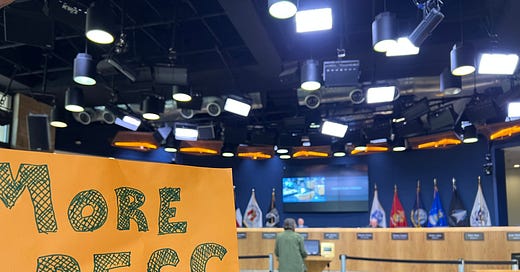Last October, I wrote on the importance of voting to drive policy and elect officials who understand that clean and abundant energy drive sustainable and healthy societies. Voting is important, but there are still ways that you should stay informed and involved outside of elections. Now is a particularly important time to pay attention.
The National Budget
National politics attracts the most mass media attention since it’s the most broadly applicable to a broad audience. According to the Center for Climate and Energy Solutions Clean Energy Innovation Funding Freeze tracker, the federal funding freeze has already cost our economy almost $1.4T.

If the proposed federal budget passes, the long-term impacts will be deeper and longer lasting. As of today, it sits with the Senate for reconciliation. If you live in a state with a Republican senator, the most important thing you can do is write your senator and urge them to consider the catastrophic effects repealing the IRA tax credits will have on our economy. Solar United Neighbors can help you plan how to meet with your representatives. At a national level, the Senate is our last chance to prevent higher energy prices and falling farther behind in the race to a clean and abundant energy future.
State Policy
Texas is just about to wrap up its biennial legislative session, and it has been a nail bitter for us clean energy advocates in the state. Several concerning bills that would have sabotaged Texas's energy future fortunately failed to pass before deadline. One notable example was SB 388, which required matching every new renewable project with an equal amount of gas generation. Given that renewables make up over 90% of new power coming online in Texas, and new gas turbines have a multi-year backlog, this would have effectively frozen new power development. Thanks to experts like
at the Texas Energy and Power Newsletter for highlighting how these proposals threatened both affordability and reliability in a state that prides itself on being an energy leader.This month, Virginia, my other home state, has good energy news. A groundbreaking law mandating the creation of a 450-megawatt (MW) virtual power plant (VPP) pilot program has been passed. This bipartisan initiative represents a significant shift in how distributed energy resources (DERs) are integrated into the state’s electricity grid and offers a model for other states to follow. As electricity demands driven by data centers and industrial electrification grow, programs like these can help reduce costs to consumers. For more info on policies being considered across all states, check out SEPA’s Virtual Power Plants and Supporting Distributed Energy Resources Snapshot Report from 2024.
Several excellent resources can help guide your advocacy efforts to stay informed and take action in your own state. Inside Climate News offers detailed local reporting through their ICN Local hub, covering climate and energy developments across different regions. Powerlines.org focuses on the influence our Public Utility Commissions have on policy related to transmission projects and affordability. For those working directly with advocacy organizations, the Climate Advocacy Lab offers tested strategies and tools for effective climate action, drawing from successful campaigns nationwide. If you want to go even deeper to understand the specific impacts of energy policies in your state, RMI's Energy Policy Simulator lets you explore different scenarios and their effects on emissions, costs, and health outcomes. Because our electricity grid is made of many regional systems, local advocacy particularly important.
Local Policy Impact
I enjoy participating in local events because it’s easier to see immediate impact and the social element of meeting other people in my community with shared values. Last week I joined other Austinites to visit City Hall and participate in a Clean Energy Advocacy Day organized by Public Citizen to advocate for more solar and batteries on city buildings. Since city buildings are a major part of Austin’s operating budget, transitioning them to cheaper renewable energy sources could save taxpayers millions while reducing emissions.
The C40 Network of Climate City Leaders publishes a knowledge hub with resources and guides on how to drive change in your city. If you are concerned with energy efficiency policy, the American Council for an Energy Efficient Economy (ACEEE) has a State and Local Policy Database that helps you find information across government, utility, transportation, and appliance standards.
I’m a big believer in the power of technology and markets to make a positive impact in the world. That said, the public policy and decisions of our governments have the ability to accelerate those systems or handcuff them. It’s important that we voice our intentions with policymakers and administrators not just during elections but while they are in session and enacting the priorities their constituents have voted for. You’ve likely shared my frustration (and often despair) with many of the decisions made by our politicians lately. I refuse to allow that to make me feel helpless and will continue to stay engaged in the future we all want to see.





Ford executives calling alarm about how the proposed policy to drop the tax credits will hurt US car companies:
https://www.reuters.com/business/autos-transportation/ford-executive-says-loss-federal-funding-could-imperil-battery-factory-2025-05-29/